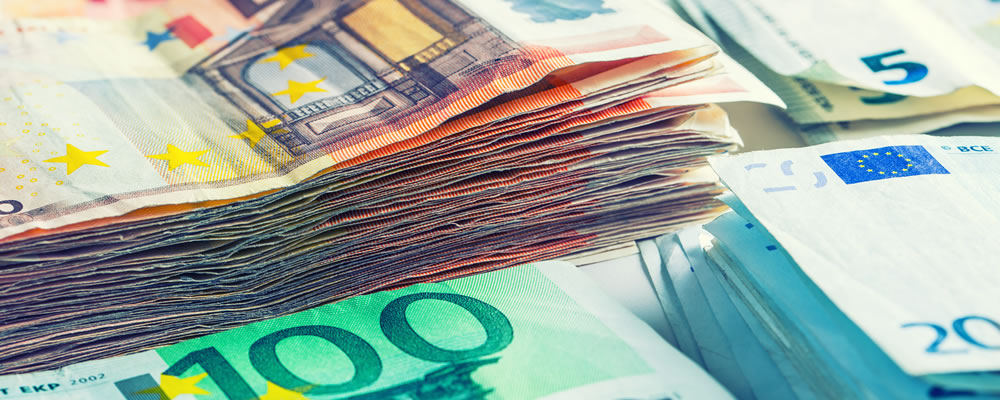- Dovish comments from BoE Chief Economist ended Pound’s bullish run – Investors deterred by heightened prospect of August rate cut
- Euro trended higher despite narrowing Eurozone trade surplus – Improved market confidence boosted single currency
- UK Consumer Price Index forecast to provoke Sterling volatility – Stronger inflationary pressure may have muted impact
- No change in policy expected from European Central Bank – Dovish signals from policymakers could dent EUR GBP exchange rate
Despite shedding gains in response to a surprise lack of action from the Bank of England (BoE) the EUR GBP trended higher once again ahead of the weekend.
But how is the Euro likely to perform this week? And what’s likely to inspire EUR movement in the days ahead? Here we’ll summarise what happened last week and what to expect moving forward. Of course, the week’s big news is the European Central Bank’s (ECB) interest rate decision. If the central bank indicates that further stimulus is on the way it could put the Euro under pressure.
BoE Relief Rally Tailed Off to Bolster EUR GBP Exchange Rate
While the Pound (GBP) had rallied strongly in response to the Bank of England’s (BoE) unexpected decision not to alter monetary policy at its first post-Brexit meeting this buoyance soon began to fade. Investors were discouraged on Friday to find that the May Construction Output figures had contracted further, suggesting that the sector was under pressure even before the shock result of the referendum. Further downside pressure was added to Sterling by comments from BoE Chief Economist Andy Haldane, who reaffirmed his dovish position. As Haldane strengthened the odds that easing will come in August this dented demand for the embattled Pound.
Confidence in the Euro (EUR) strengthened, meanwhile, in spite of some mixed domestic data. The finalised Eurozone Consumer Price Index for June did not offer any particular surprises to investors, showing no change from the provisional figure at just 0.1%. While this indicated that inflationary pressure remains muted within the currency union the lack of downward revision boosted the Euro. Markets were also inclined to dismiss a disappointing May trade balance, which showed a greater-than-expected narrowing of the trade surplus. Nevertheless, the Euro to Pound (EUR GBP) exchange rate trended higher ahead of the weekend, recovering some of the week’s losses.
Pound (GBP) Volatility Forecast with UK Inflation Data
Tuesday’s UK Consumer Price Index report is likely to provoke fresh volatility for the Pound, despite the fact that the June measure will not account for the impact of the EU referendum. Investors will be keen to get an idea of domestic inflationary pressure, nonetheless, although an uptick may not be received as positively as might be expected. There are worries that inflation could strengthen significantly as a result of Brexit-based uncertainty, which could colour the market reaction to the CPI report.
However, as Ross Walker, Research Analyst at RBS, noted:
‘The Pound’s post-referendum slide comes against the backdrop of a recovery already betraying signs of waning momentum and more acute underlying imbalances. We are highly sceptical that the currency-induced inflation shock will prove persistent. Against a backdrop of nominal income growth falling further below trend, firms will struggle to pass on price increases and will resort to squeezing wages in order to offset the energy/import price shock’
EUR GBP Exchange Rate Predicted to Weaken Despite Low Odds of ECB Easing
The week’s primary focus for the Euro, on the other hand, will be the latest European Central Bank (ECB) policy meeting. While expectations are for President Mario Draghi and other policymakers to remain in a ‘wait and see’ mind-set, however, this is unlikely to prevent the single currency from weakening in anticipation of the event. In particular interest will be on what the ECB has to say with regards to Brexit, and any negative impact it may already be having on the currency union. As researchers at TD Securities commented:
‘We think that another rate cut is still a good bet before year-end, but there’s no immediate need to act with market conditions having held up better than we had expected and only modest downgrades to EZ growth forecasts.’
Potential indications of the impact of the UK referendum result on the domestic economy are expected in the form of the July German ZEW Business Sentiment Survey and various Eurozone PMIs. Should these point towards a slowdown in growth then the EUR GBP exchange rate is expected to weaken.



